Gift of the Generations
We introduced Alana and her This Wonderful World project when she attended the Pollinator Pathway garden installation and created a series of three songs from that experience. Since then, she’s done a series of songs about the installation of Peace of Eden community garden at City Church Fairfield, and a series inspired by the Vallejo People’s Garden. This is her reflection and the last song in her spring series — it highlights community gardens through SuSol’s Solano Gardens program. We appreciate reposting it here with her permission.
I’ve never felt like I had much of a green thumb. Though I’ve always known that growing a garden is a staple of sustainable living, I never really felt capable. Growing up, we didn’t have a garden. Other than the tomatoes that my grandpa grew, or my great-grandma’s home-dried oregano, I just thought food came from the store.
It wasn’t until I found Sustainable Solano that things began changing. I remember the first time I went to one of their community events — such diversity! All ages, shapes, colors and sizes were represented. There were people who seemed super experienced in the garden, and then there were folks (like me) who found the courage to show up as amateurs.
No one embarrassed us. No one rolled their eyes. Tips were shared with kindness and patience. I felt embraced and appreciated just for showing up. There seemed to be a shared understanding: we’ve all grown up in a culture that’s been disconnected from the source, and we’re all still finding our way home.
Before the rise of industrial agriculture, participating in the cultivation of food has been a human staple. But my great-grandma’s generation tended not to pass it on. Why would she? The Great Depression was hard and the supermarkets were miraculous. All it took was one generation for that long line of ancestral wisdom to disappear.
Fortunately, it wasn’t lost completely, which is evident in the fact that there’s enormous efforts being put forth to help reestablish our most basic connection with Earth: food. For non-home owners (like me — and 44% of California), just having a place to practice gardening is a gift. But when you add education and community to that, the roots really start to grow back. Recently the Surgeon General, Vivek Murthy, declared loneliness an epidemic where 60% of us feel a desperate hunger for belonging. His solution: social connection.
The garden not only offers a place to connect, but a way to connect. Metaphors of the earth remind us of our shared human condition where we all know what it’s like to be vulnerable when we sprout and withered when we’re spent. We all know the frustration from pesky weeds and the exhilaration of fruit that’s sweetening. The garden gives us language to connect in where we all belong, through the seasons, in the bird song. Here we are reminded that it’s OK to need each other. Witnessing the bees pollinating, the fungi decomposing, the compost nourishing, we are reassured that everything needs each other, and everything has something to give. We are reminded of the abundance that comes when we work together — how precious the fruit is when our love has nurtured it.
It may sound a bit woo-woo, but it’s true: there’s a vibration that’s inherent. As one of the program managers for Solano Gardens, Jazzmin Ballou, confidently confirmed: “all I need to do is touch the Earth to tune in, and quiet my mind, to give me a glorious sense of sacred belonging.”
It’s truly a gift. As someone who has struggled with my fair share of loneliness, I hardly recognize myself after spending these last few months in community gardening. As much as self-help strategies have served me, there’s been no greater cure than serving. Of course I’m still learning a lot, but I’m not as embarrassed about it anymore. The confidence and connection that comes from growing together has sent ripples through my whole life. It’s an overflow that’s yearning to be shared, a gift begging to be given, a joy to pass on (as our ancestors did not so long ago) to a world that, every day, is rediscovering our beauty.
Thank you for reminding me.
This Wonderful World is the latest production from Alana’s greater work, called The Living Mirror Project, a creative practice that generates peace by seeing ourselves in everything.
Learn more about This Wonderful World here
Watch the whole series here
Sign up for Alana’s newsletter here
Contact Alana at thelivingmirrorproject@gmail.com if there are any service events that you think should be celebrated in this series, or for more info on booking a live musical show.

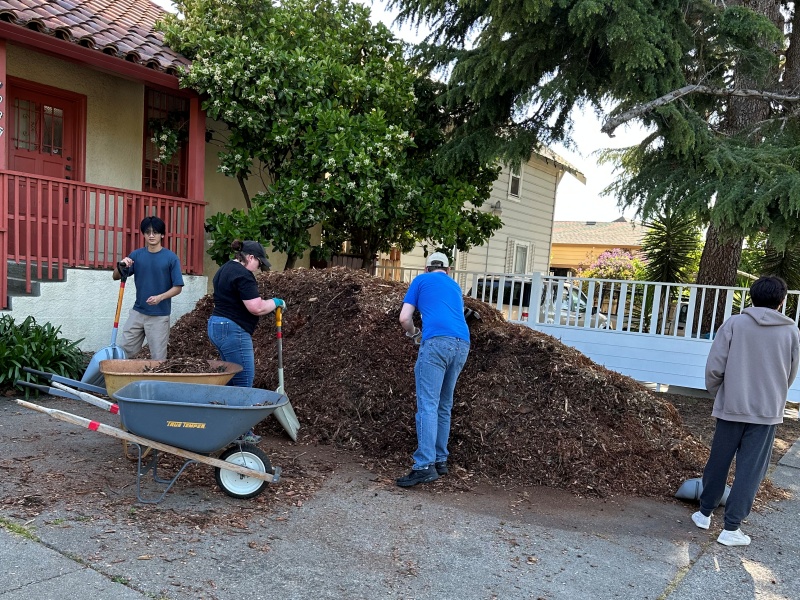
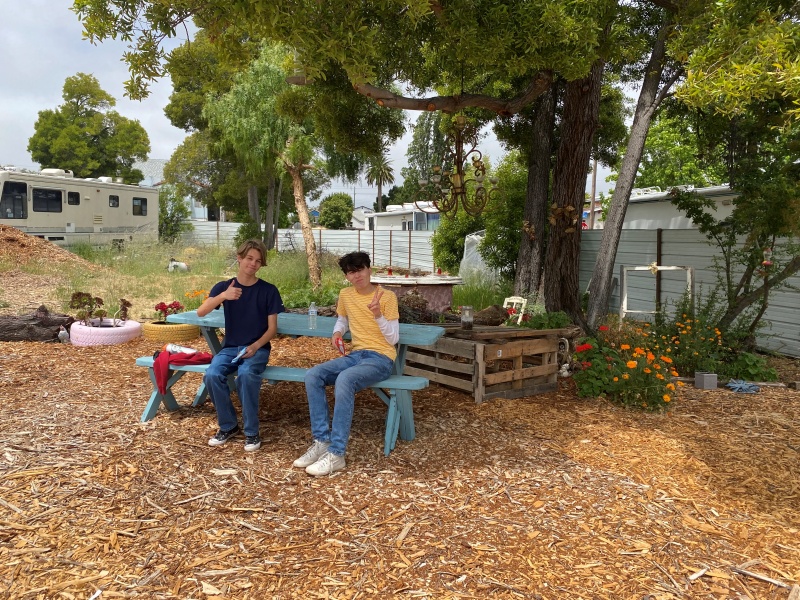
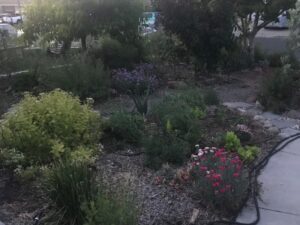 This Food Forest Keeper was inspired to transform her lawn into a garden full of healthy soil with microbial diversity, having installed a swale and berm and started the transformation when SuSol selected the site for a demonstration food forest. The garden thrives with a diversity of plants that support one another and manure, worm castings and compost inoculation to nurture the soil, without additional amendments and inputs.
This Food Forest Keeper was inspired to transform her lawn into a garden full of healthy soil with microbial diversity, having installed a swale and berm and started the transformation when SuSol selected the site for a demonstration food forest. The garden thrives with a diversity of plants that support one another and manure, worm castings and compost inoculation to nurture the soil, without additional amendments and inputs.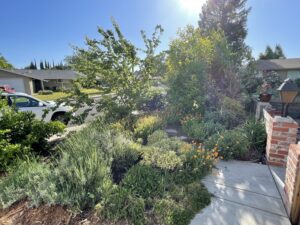 This garden has eight thriving fruit trees in a small front yard, as well as a plethora of herbaceous and shrub plants. The vegetation is watered through a combination of swales that collect rainwater, greywater from the laundry, and (rarely utilized) drip irrigation. The yard has, like any good forest should, taken on a life and energy of its own, constantly changing and morphing year over year, but never failing to provide the residents, neighbors, and several local food banks with fruits and vegetables.
This garden has eight thriving fruit trees in a small front yard, as well as a plethora of herbaceous and shrub plants. The vegetation is watered through a combination of swales that collect rainwater, greywater from the laundry, and (rarely utilized) drip irrigation. The yard has, like any good forest should, taken on a life and energy of its own, constantly changing and morphing year over year, but never failing to provide the residents, neighbors, and several local food banks with fruits and vegetables.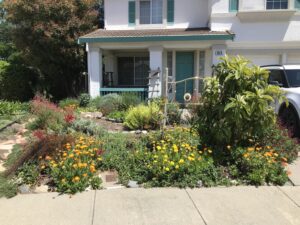 This four-year-old front yard garden welcomes the neighborhood to pick as they please. The yard extends to the backyard with pollinator plants intermixed with edibles, chickens, repurposed items, a native sedge field and so much more. This yard integrates systems to benefit the whole property.
This four-year-old front yard garden welcomes the neighborhood to pick as they please. The yard extends to the backyard with pollinator plants intermixed with edibles, chickens, repurposed items, a native sedge field and so much more. This yard integrates systems to benefit the whole property.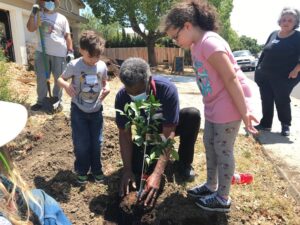 This front yard garden was installed in May 2021 with the focus on growing food and a desire to share with neighbors. A large swale in the front wraps around the yard and supports fruit trees and pollinators.
This front yard garden was installed in May 2021 with the focus on growing food and a desire to share with neighbors. A large swale in the front wraps around the yard and supports fruit trees and pollinators.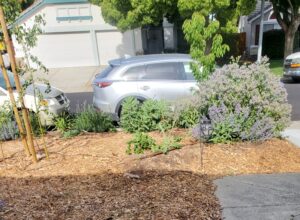 This small, beautiful, low maintenance front yard garden offers easy access to culinary herbs and three fruit tree guilds supported with yarrow, comfrey and borage.
This small, beautiful, low maintenance front yard garden offers easy access to culinary herbs and three fruit tree guilds supported with yarrow, comfrey and borage.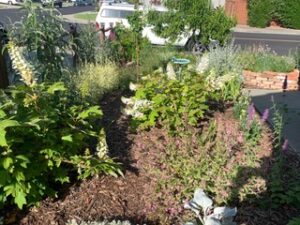 Homeowners Mike and Sherry participated in SuSol’s DIY Sustainable Design course after working with SuSol to create a demonstration food forest garden and laundry-to-landscape greywater system at the family home that has housed four generations (
Homeowners Mike and Sherry participated in SuSol’s DIY Sustainable Design course after working with SuSol to create a demonstration food forest garden and laundry-to-landscape greywater system at the family home that has housed four generations (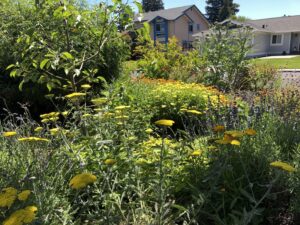 This garden was a front lawn conversion in 2019. It is filled with vegetables, fruits, herbs and more, building healthy soil and harvesting water from the roof.
This garden was a front lawn conversion in 2019. It is filled with vegetables, fruits, herbs and more, building healthy soil and harvesting water from the roof.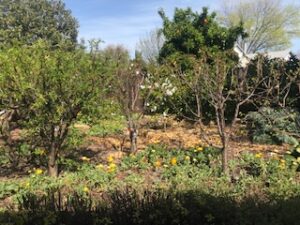 Installed in 2017, this backyard food forest has 21 fruit trees pruned annually to 5 feet, making it easier to access the fruit. The majority of the trees are watered by rain funneled into a swale, while others are watered from the laundry-to-landscape greywater system. An automatic drip system is used during the dry periods. All the fruits are shared with neighbors, friends and family. Additional plantings of salvia and calendula draw in honey bees and hummingbirds.
Installed in 2017, this backyard food forest has 21 fruit trees pruned annually to 5 feet, making it easier to access the fruit. The majority of the trees are watered by rain funneled into a swale, while others are watered from the laundry-to-landscape greywater system. An automatic drip system is used during the dry periods. All the fruits are shared with neighbors, friends and family. Additional plantings of salvia and calendula draw in honey bees and hummingbirds.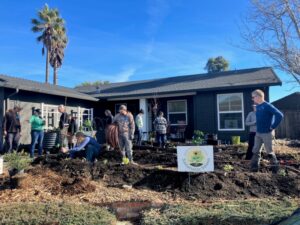 This garden was just planted in January 2023 as a collaborative project between Sustainable Solano and Solano 4-H. Youth members learned about permaculture and designing within the homeowners’ needs, then applied their new knowledge to a plan that includes fruit trees, pollinators and edible annuals. This site is especially susceptible to the western winds, which have annual summer gusts up to 40 mph. The garden is a work in progress as a learning space for 4-Hers for years to come.
This garden was just planted in January 2023 as a collaborative project between Sustainable Solano and Solano 4-H. Youth members learned about permaculture and designing within the homeowners’ needs, then applied their new knowledge to a plan that includes fruit trees, pollinators and edible annuals. This site is especially susceptible to the western winds, which have annual summer gusts up to 40 mph. The garden is a work in progress as a learning space for 4-Hers for years to come.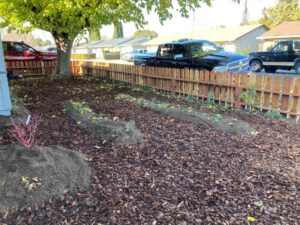 This garden is a demonstration in community and environmental resilience. Homeowners Heidi and Mitch had dealt with a wildfire taking their home in 2020. The garden was designed around a large maple tree, the only thing that survived the fire, and was named in Gaelic to harken back to Mitch’s native Scottish roots. It was installed December 2022.
This garden is a demonstration in community and environmental resilience. Homeowners Heidi and Mitch had dealt with a wildfire taking their home in 2020. The garden was designed around a large maple tree, the only thing that survived the fire, and was named in Gaelic to harken back to Mitch’s native Scottish roots. It was installed December 2022.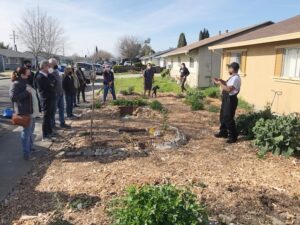 Installed in 2021 to mitigate the effects of flooding, this food forest garden is complete with chickens and a laundry-to-landscape greywater system. This yard has multiple fruit trees and pollinator plants.
Installed in 2021 to mitigate the effects of flooding, this food forest garden is complete with chickens and a laundry-to-landscape greywater system. This yard has multiple fruit trees and pollinator plants.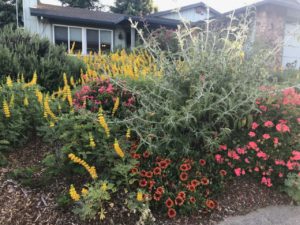 Mature front yard food forest has mostly fruit trees and native plants that attract pollinators year-round. It has a laundry-to-landscape greywater system.
Mature front yard food forest has mostly fruit trees and native plants that attract pollinators year-round. It has a laundry-to-landscape greywater system.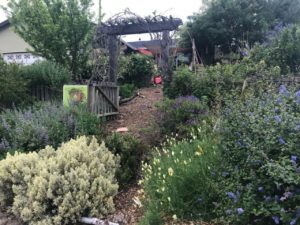 An 8-year-old established food forest with two swales that are dug out and refreshed every 2-3 years, laundry-to-landscape greywater to fruit trees, and chickens. The drip irrigation system was removed three years ago and the garden is thriving! Annual beds are hand-watered once a week during the growing season. Greyhawk Grove is a “high-traffic-survival-of-the-fittest-have-three-young-children garden”. There may be lemonade and baked goods for sale by children, as well as products from the garden to give away (dried calendula, lavender, herbs, eggs, fruit, etc.).
An 8-year-old established food forest with two swales that are dug out and refreshed every 2-3 years, laundry-to-landscape greywater to fruit trees, and chickens. The drip irrigation system was removed three years ago and the garden is thriving! Annual beds are hand-watered once a week during the growing season. Greyhawk Grove is a “high-traffic-survival-of-the-fittest-have-three-young-children garden”. There may be lemonade and baked goods for sale by children, as well as products from the garden to give away (dried calendula, lavender, herbs, eggs, fruit, etc.).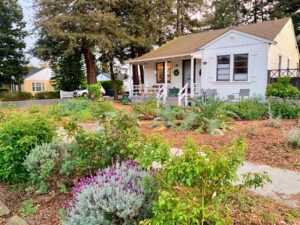 Food forest garden and greywater system installed as part of Sustainable Solano’s 2021
Food forest garden and greywater system installed as part of Sustainable Solano’s 2021 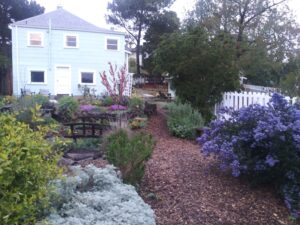 Southern slope food forest focused on pollinators, shrubs and native plants. It also includes fruit trees, perennial and edible plants, swales and a laundry-to-landscape greywater system.
Southern slope food forest focused on pollinators, shrubs and native plants. It also includes fruit trees, perennial and edible plants, swales and a laundry-to-landscape greywater system.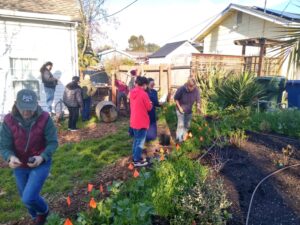 A new and evolving food forest garden and greywater system installed as part of Sustainable Solano’s 2022-23
A new and evolving food forest garden and greywater system installed as part of Sustainable Solano’s 2022-23 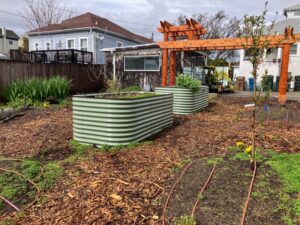 This homeowner attended our tours and was inspired to transform his yard! This brand new garden, designed by Michael Wedgley, is a unique opportunity to tour a stunning and sustainable backyard that showcases the beauty and abundance of permaculture. This eco-conscious backyard features a rainwater catchment system that can harvest up to 3,500 gallons per year, helping to restore the on-site water table, and providing an abundant source of water for this permaculture food forest.
This homeowner attended our tours and was inspired to transform his yard! This brand new garden, designed by Michael Wedgley, is a unique opportunity to tour a stunning and sustainable backyard that showcases the beauty and abundance of permaculture. This eco-conscious backyard features a rainwater catchment system that can harvest up to 3,500 gallons per year, helping to restore the on-site water table, and providing an abundant source of water for this permaculture food forest.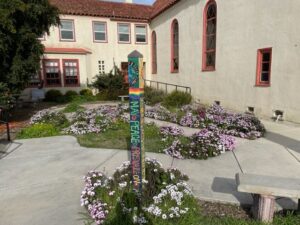 Two separate gardens, one is a peace garden with mostly flowers, cactus and trees and the other is the vegetable garden, called Johnson Ranch. The vegetable garden was revived through the
Two separate gardens, one is a peace garden with mostly flowers, cactus and trees and the other is the vegetable garden, called Johnson Ranch. The vegetable garden was revived through the 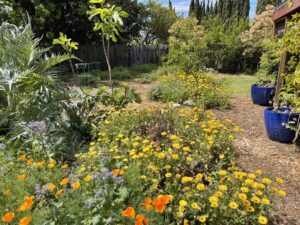 Morningside Botanical Bounty food forest was created as part of the
Morningside Botanical Bounty food forest was created as part of the 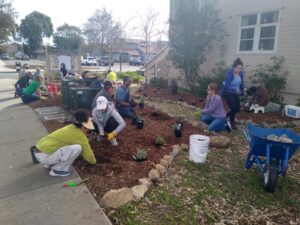 Pollinator food forest garden filled with a variety of California native plants that support the habitat of butterflies, bees, moths, wasps, hummingbirds and so much more. This garden was just installed in February 2023 as a collaboration with a variety of organizations including Vallejo People’s Garden, Vallejo Project, Solano Resource Conservation District and Monarch Milkweed Project. Alanna Mirror wrote three songs inspired by the installation, featured in her
Pollinator food forest garden filled with a variety of California native plants that support the habitat of butterflies, bees, moths, wasps, hummingbirds and so much more. This garden was just installed in February 2023 as a collaboration with a variety of organizations including Vallejo People’s Garden, Vallejo Project, Solano Resource Conservation District and Monarch Milkweed Project. Alanna Mirror wrote three songs inspired by the installation, featured in her 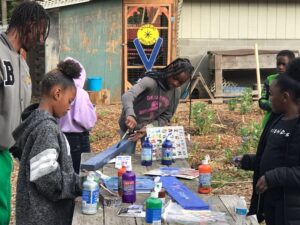 Vallejo Project’s Unity Garden initiative restored an abandoned lot that was once filled with sand and garbage and turned it into a multi-level food forest with internationally influenced farming techniques and 10 chickens. This garden is focused on urban agriculture.
Vallejo Project’s Unity Garden initiative restored an abandoned lot that was once filled with sand and garbage and turned it into a multi-level food forest with internationally influenced farming techniques and 10 chickens. This garden is focused on urban agriculture.